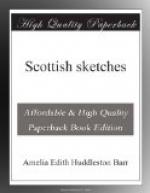Then he turned to Prince Charlie. How strange is that vein of romantic loyalty marbling the granite of Scotch character! The common-place man of coal and iron became in the presence of his ideal prince a feudal chieftain again. His heart swelled to that pictured face as the great sea swells to the bending moon. He understood in that moment how his fathers felt it easy to pin on the white cockade and give up everything for an impossible loyalty.
The dominie found him in this mood. He turned back to every-day life with a sigh.
“Weel, dominie, you are a man o’ taste. When did you begin buying pictures?”
“I hae no money for pictures, laird. The artist gave me them.”
“You mean Colin Crawford gave you them.”
“That is what I mean.”
“Weel, I’m free to say Colin kens how to choose grand subjects. I didna think there was so much in a picture. I wouldna dare to keep that poor dear prince in my house. I shouldna be worth a bawbee at the works. It was a wonderfu’ wise step, that forbidding o’ pictures in the kirks. I can vera weel see how they would lead to a sinfu’ idolatry.”
“Yes, John Knox kent well the temper o’ the metal he had to work. There’s nae greater hero-worshippers than Scots folk. They are aye making idols for themsel’s. Whiles it’s Wallace, then it’s Bruce or Prince Charlie; nay, there are decent, pious folk that gie Knox himsel’ a honoring he wouldna thank them for. But, laird, there is a mair degraded idolatry still—that o’ gold. We are just as ready as ever the Jews were to fall down before a calf, an’ it only be a golden one.”
“Let that subject alane, dominie. It will tak a jury o’ rich men to judge rich men. A poor man isna competent. The rich hae straits the poor canna fathom.”
And then he saw in light as clear as crystal a slip of paper hid away in a secret drawer.
Just at this moment a little lad bairn entered the room; a child with bright, daring eyes, and a comically haughty, confident manner. He attracted Crawford’s attention at once.
“What’s your name, my wee man?”
“Alexander is my name.”
“That is my name.”
“It is not,” he answered positively; “don’t say that any more.”
“Will you hae a sixpence?”
“Yes, I will. Money is good. It buys sweeties.”
“Whose boy is that, dominie?”
“Mrs. Hope’s. I thought he would annoy you. He is a great pleasure to me.”
“Let him come up to the Keep whiles. I’ll no mind him.”
When he rose to go he stood a moment before each picture, and then suddenly asked,
“Whar is young Crawford?”
“In Rome.”
“A nice place for him to be! He’d be in Babylon, doubtless, if it was on the face o’ the earth.”
When he went home he shut himself in his room and almost stealthily took out that slip of paper. It had begun to look yellow and faded, and Crawford had a strange fancy that it had a sad, pitiful appearance. He held it in his hand a few moments and then put it back again. It would be the new year soon, and he would decide then. He had made similar promises often; they always gave him temporary comfort.




